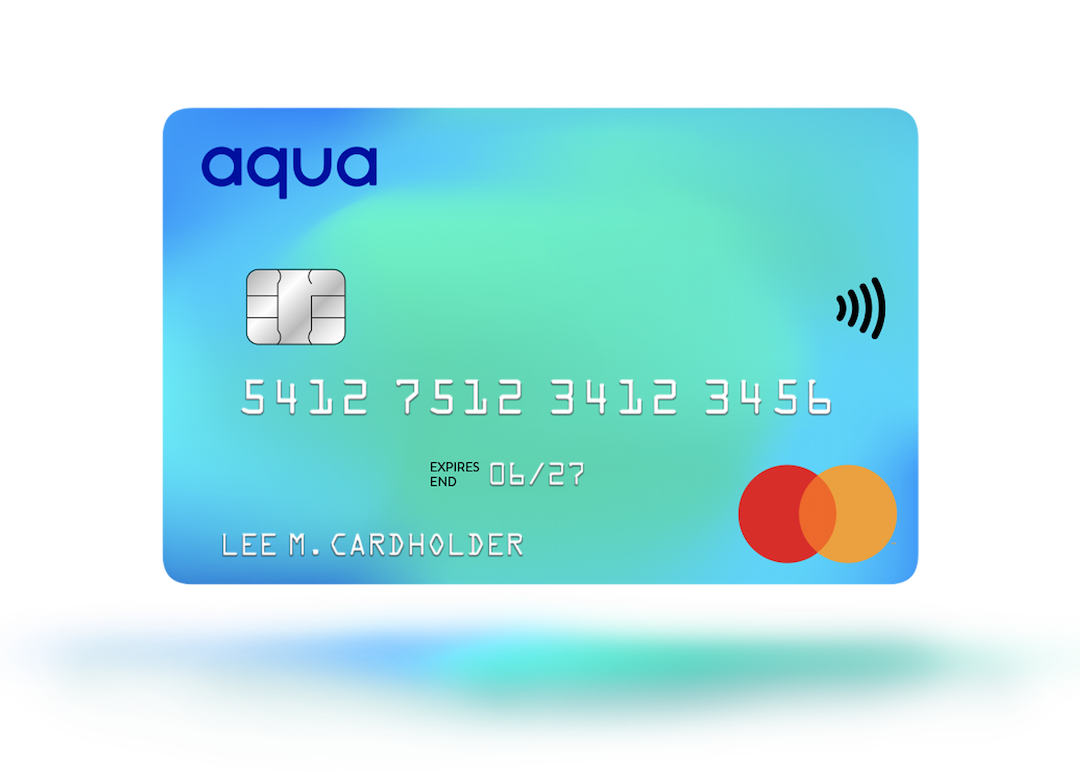In this article
Your first credit card – our guide
Helping you understand your first credit card. From choosing the right card to building credit responsibly, navigate credit confidently with our guide.

Applying for your first credit card might feel a little daunting. So we’ve created this guide to give you a better understanding of credit cards and give you some of the knowledge you might need to apply for your first credit card, including what to consider when choosing your first credit card and how to build, improve and maintain your credit score.
What are credit cards?
Credit cards are often surrounded by confusing terms and technicalities. But when you strip away the jargon, they’re much simpler than you might think.
Unlike debit and prepaid cards, credit cards work by lending you up to a maximum amount known as a credit limit. You can use your credit card to pay for things online, at the shops or in restaurants, often anywhere in the world.
Every time you make a purchase on your credit card, the amount you spend is added to your balance which you owe to the lender and which can be paid back in full, or you can choose to spread the repayments over time. If you pay back what you borrow in full each month as detailed in your monthly statement, you usually won’t pay any interest on your purchases. Any balance carried forward will be subject to interest, which will be determined by the APR for purchases (your Purchase Rate) of your credit card.
To help you understand the cost of borrowing, every lender must display the APR in their advertising. This is stated as an annual figure that takes into account the credit card interest rate plus any other fees, including annual fees from your lender. However, the APR you receive upon being accepted for the card could be higher. Learn more about APR.
What are the benefits of getting a credit card?
Here are some of the key benefits of getting your first credit card.
Building credit history and establishing a credit score
Credit cards like the Aqua Classic could help you build good credit – provided you manage your account responsibly. That means making at least the minimum payment each month, as well as staying well below your credit limit. You should also consider paying more than the minimum payment if you are able to. Managing your credit card responsibly could help you build your credit score over time. This could mean that you could find it easier to secure a loan, mortgage or anything else that requires a credit check in the future.
Representative 34.9% APR (variable) for Aqua Classic.
Spreading costs
If you don’t have enough money to pay for a big purchase upfront, such as a laptop or washing machine, a credit card gives you the ability to spread the costs. Remember, if you don't repay your monthly statement balance on time and in full every month, you'll be charged interest on the balance carried forward, which will be determined by the APR for purchases (your Purchase Rate) of your credit card.
Payment protection
Many credit card purchases are protected under Section 75 of the Consumer Credit Act 1974. So, if there is a breach of contract or misrepresentation by the supplier of the goods and services bought using your credit card, you might be able to claim your money back from the card issuer.
Perks and rewards
Some credit cards come with perks and rewards which might include points, airline miles and travel benefits. With an Aqua Classic credit card, you’ll get personalised credit limits, support from Aqua Coach, 24/7 fraud protection to keep your account safe, and access to discounts and treats from our partners – so building your credit can also be rewarding. Learn more about Aqua rewards.
Representative 34.9% APR (variable) for Aqua Classic.
Fraud protection
Credit card providers cannot hold you liable for fraudulent transactions made on your card if you report the theft or loss of the card on time.
If a fraudster makes a transaction on your card before the theft of your card is reported, the maximum liability is £35. If your provider has a zero-liability fraud policy (or you report the theft of your card before a fraudulent purchase is made) you may not lose any money.
Balance transfer
A credit card balance transfer gives you the ability to transfer the balance from one credit card, where you might be paying a higher amount of interest, to another credit card with a lower interest rate, or which has an introductory offer, such as 0% for six months. To help you manage your money, you can also use balance transfers to move balances from multiple cards onto a single card. You may be charged a balance transfer fee, which is set out as a percentage of the balance you are transferring unless you have been given a promotion with a zero balance transfer fee. It's important you check this before you apply.
What are the disadvantages of a credit card?
As well as the advantages discussed above, there are potential disadvantages for those who don’t manage their account well.
Fees and charges
As well as an annual percentage rate (APR), some credit cards come with other fees and charges you should check with your lender. For example, if you use your credit card to withdraw cash or to make other cash-related payments, you could be charged a percentage of the transaction amount.
Credit score impacts
While using a credit card responsibly can be a great way to build your credit score, not managing your account well can have the opposite effect. Missing repayments could negatively impact your credit score and make it harder to secure a loan, take out another credit card, or even get a mortgage in the future. With a lower credit score, you’ll also be considered a higher risk by lenders and will likely face higher interest rates on any borrowing.
Debt
With a credit card, you are borrowing money from your chosen lender. If you miss a payment or don’t pay off your balance in full each month, you will likely incur interest and add to your overall debt. In the worst case, you could damage your credit score or even go bankrupt.
So, if you’re thinking about getting a credit card, make sure you’re aware of the fees and are able to make the repayments. This way, you can build your credit and make the most of the features that credit cards can offer.
Choosing the right first-time credit card
If it’s your first time applying for a credit card, you might find the choice of cards overwhelming. To help you make the right decision, here’s a summary of a few common credit card types you might want to consider.
Credit cards to build credit
Otherwise known as a ‘credit builder credit card’ or ‘rebuilder credit card’, a credit card to build credit is designed for those who want to build their credit history and improve their credit score. This is a popular card for first-time credit card holders who haven’t built a strong enough credit score to secure other credit cards, a mortgage or other types of loans that require a credit check and a higher credit score. Aqua is a credit-builder card and could help you build your credit score if you manage your account well, for example, by making monthly payments on time each month and not going over your credit limit. Plus, it comes with Aqua Coach – your guide to building better credit. Learn more about Aqua card.
Representative 34.9% APR (variable) for Aqua Classic.
Reward credit cards
These types of cards offer cashback and other types of rewards, usually based on a percentage of the amount you spend. Provided it’s used responsibly, and minimum payments are made on time, a rewards card can offer regular benefits as well as build your credit score.
Travel credit cards
A travel credit card is designed for jet-setters who want a cheaper way to spend money overseas. Where some credit cards charge you for using your card abroad, a travel card typically comes with fee-free foreign transactions and may offer better exchange rates.
It’s important to note travel cards are not currency cards that you preload with spending money before you travel. Providers should make this clear at the outset.
Reducing interest rate credit cards
These types of cards are similar to the rebuilder credit cards we covered earlier but come with the bonus of reducing your interest rate over time. If you make payments on time and stay within your credit limit, your initial interest rate is designed to drop at specified intervals outlined by your provider.
Purchase offer credit cards
Purchase credit cards are often used to help spread the cost of big purchases such as appliances, holidays or a new car. In most cases, these types of cards come with an introductory offer, such as 0% interest for 6 months, which means you won’t pay any interest on purchases for a set period, which varies depending on the lender. It’s important to take note of any fees and the interest rate you will be on when the promotional period ends.
Building, improving and maintaining credit
A healthy credit score can be really important if you wish to apply for a loan, secure a mortgage or even get a mobile phone contract. As someone new to credit, you should do everything you can to show lenders you’re responsible with money. Here are some ways that will help you keep your credit healthy.
Pay your bills on time
It might seem obvious, but paying your bills on time will keep your score on track and demonstrate to lenders you’re in control of your finances. Missing payments signals the opposite.
Set up direct debit payments
Where you can, it is a good idea to set up direct debit payments to make sure bills are automatically paid on time every month. By managing your outgoings this way, you will be less likely to make late payments which affect your credit score.
Check your credit report
Checking your credit report is one of the best ways to keep your score healthy. Even the smallest of mistakes in your report can affect your credit score, so make sure you review your report regularly and report anything that doesn’t look right to the credit reference agency where you checked your score to get it amended.
Tips for responsible credit card use
Having a credit card can help you stay on track with your finances, but only if it’s used responsibly. Here are some tips to help you enjoy the benefits of a credit card and avoid the drawbacks.
Set a budget
Credit cards can be a convenient way to increase your spending power and spread the cost of big purchases, but it can be easy to overspend if you’re not careful. Creating an effective budget is an excellent way to stay on top of your spending. A budget can help you understand how much you can afford to spend on your credit card each month to avoid carrying a balance and accruing interest.
Make payments on time
Being aware of how much you’re spending and what you can afford to repay every month is a sensible way to manage your credit card payments. If you make a payment after the date listed on your credit card statement, you may be charged a late payment fee which varies depending on your lender. It can also affect your credit score and make you ineligible for any promotional rate you have been benefitting from.
Top tip: Set up a direct debit for at least the contractual minimum payment each month. That way, you’ll avoid any late payment fees and missed payments, which can negatively impact your credit score.
Pay off your balance (where possible)
It’s easy to fall into the habit of only making the contractual minimum payment each month. If you can, pay off as much of your balance as possible to protect your credit score, reduce the amount of interest you pay and demonstrate to lenders you’re in control of your finances.
Failure to make payments on time or to stay within your credit limit means that you will pay additional charges and may make obtaining credit in the future more expensive and difficult.
Contributors

Victoria Smith
Victoria is an editor at Aqua.

Vanessa Stewart
Vanessa is an editor at Aqua.
You might also like
Slide 1 of 3
What is a credit limit?
Find out how credit limits are set, how to increase or decrease yours, and whether you should.
Victoria Smith

How to apply for a credit card
If you’re looking to apply for a credit card then read our comprehensive guide. Learn about eligibility, credit car...
Victoria Smith

What is a credit card and how do they work? -...
Discover the basics of credit cards, how to use them, and the benefits of using credit cards in our comprehensive g...
Hayley Bevan
The smart way to build better credit
Aqua is the credit card that gives you the power to improve your credit score
